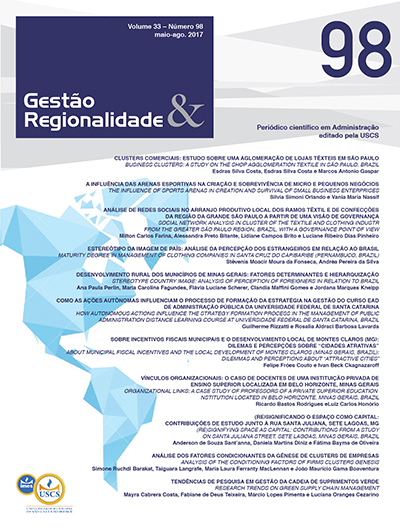Social network analysis in cluster of the textile and clothing industry from the greater Sao Paulo region, Brazil, with a governance point of view
DOI:
https://doi.org/10.13037/gr.vol33n98.3791Abstract
This article is characterized by the study of the relationships between the actors participants of the Textile and Clothing Local Productive Arrangement in the Greater São Paulo region from a point of view focused on governance. To understand the facilitating and hindering factors of relationships in a cluster, a bibliographical survey on those topics was carried on. The interviews were conducted with union representative of the textile industry, from the local municipality and a collaborator from one local university. Additionally, 26 companies from the cluster answered to a structured survey and, at last, a cluster meeting was observed in June 2015. The main conclusion of this study is that there are still more hindering factors than facilitating so that the cluster studied can succeed. These include the companies’ lack of aid/participation from the local sector productive arrangement and the shortage of skilled labor.Downloads
Downloads
Published
2017-06-05
How to Cite
Farina, M. C., Bitante, A. P., Britto, L. C., & Pinheiro, L. R. D. (2017). Social network analysis in cluster of the textile and clothing industry from the greater Sao Paulo region, Brazil, with a governance point of view. Gestão & Regionalidade, 33(98). https://doi.org/10.13037/gr.vol33n98.3791
Issue
Section
Articles
License
Copyright (c) 2017 Milton Carlos Farina, Alessandra Preto Bitante, Lidiane Campos Britto, Luciane Ribeiro Dias Pinheiro (Autor)

This work is licensed under a Creative Commons Attribution-NonCommercial-NoDerivatives 4.0 International License.
Autores que publicam nesta revista concordam com os seguintes termos:
- Autores mantém os direitos autorais e concedem à revista o direito de primeira publicação, com o trabalho simultaneamente licenciado sob a https://creativecommons.org/
licenses/by-nc-nd/4.0/ , permitindo o compartilhamento do trabalho com reconhecimento da autoria do trabalho e publicação inicial nesta revista. - Autores têm autorização para assumir contratos adicionais separadamente, para distribuição não-exclusiva da versão do trabalho publicada nesta revista (ex.: publicar em repositório institucional ou como capítulo de livro), com reconhecimento de autoria e publicação inicial nesta revista.
- Autores têm permissão e são estimulados a publicar e distribuir seu trabalho online (ex.: em repositórios institucionais ou na sua página pessoal) a qualquer ponto antes ou durante o processo editorial, já que isso pode gerar alterações produtivas, bem como aumentar o impacto e a citação do trabalho publicado (Veja O Efeito do Acesso Livre).
























